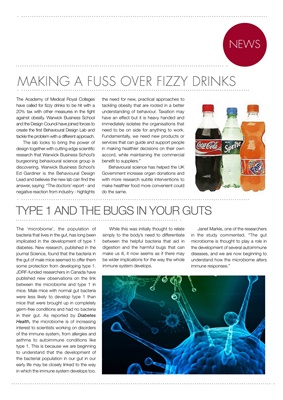
NeWS
mAkiNg A fuSS over fizzy driNkS
the academy of medical royal colleges the need for new, practical approaches to
have called for fizzy drinks to be hit with a tackling obesity that are rooted in a better
20% tax with other measures in the fight understanding of behaviour. taxation may
against obesity. Warwick business school have an effect but it is heavy handed and
and the Design council have joined forces to immediately isolates the organisations that
create the first Behavioural Design Lab and need to be on side for anything to work.
tackle the problem with a different approach. fundamentally, we need new products or
the lab looks to bring the power of services that can guide and support people
design together with cutting edge scientific in making healthier decisions on their own
research that Warwick business school’s accord, while maintaining the commercial
burgeoning behavioural science group is benefit to suppliers.”
discovering. Warwick business school’s behavioural science has helped the uk
ed gardiner is the behavioural Design government increase organ donations and
Lead and believes the new lab can find the with more research subtle interventions to
answer, saying: “the doctors’ report - and make healthier food more convenient could
negative reaction from industry - highlights do the same.
tyPe 1 anD the bugs in your guts
the ‘microbiome’, the population of While this was initially thought to relate Janet markle, one of the researchers
bacteria that lives in the gut, has long been simply to the body’s need to differentiate in the study commented, “the gut
implicated in the development of type 1 between the helpful bacteria that aid in microbiome is thought to play a role in
diabetes. new research, published in the digestion and the harmful bugs that can the development of several autoimmune
journal science, found that the bacteria in make us ill, it now seems as if there may diseases, and we are now beginning to
the gut of male mice seemed to offer them be wider implications for the way the whole understand how the microbiome alters
some protection from developing type 1. immune system develops. immune responses.”
JDrf-funded researchers in canada have
published new observations on the link
between the microbiome and type 1 in
mice. male mice with normal gut bacteria
were less likely to develop type 1 than
mice that were brought up in completely
germ-free conditions and had no bacteria
in their gut. as reported by Diabetes
Health, the microbiome is of increasing
interest to scientists working on disorders
of the immune system, from allergies and
asthma to autoimmune conditions like
type 1. this is because we are beginning
to understand that the development of
the bacterial population in our gut in our
early life may be closely linked to the way
in which the immune system develops too.